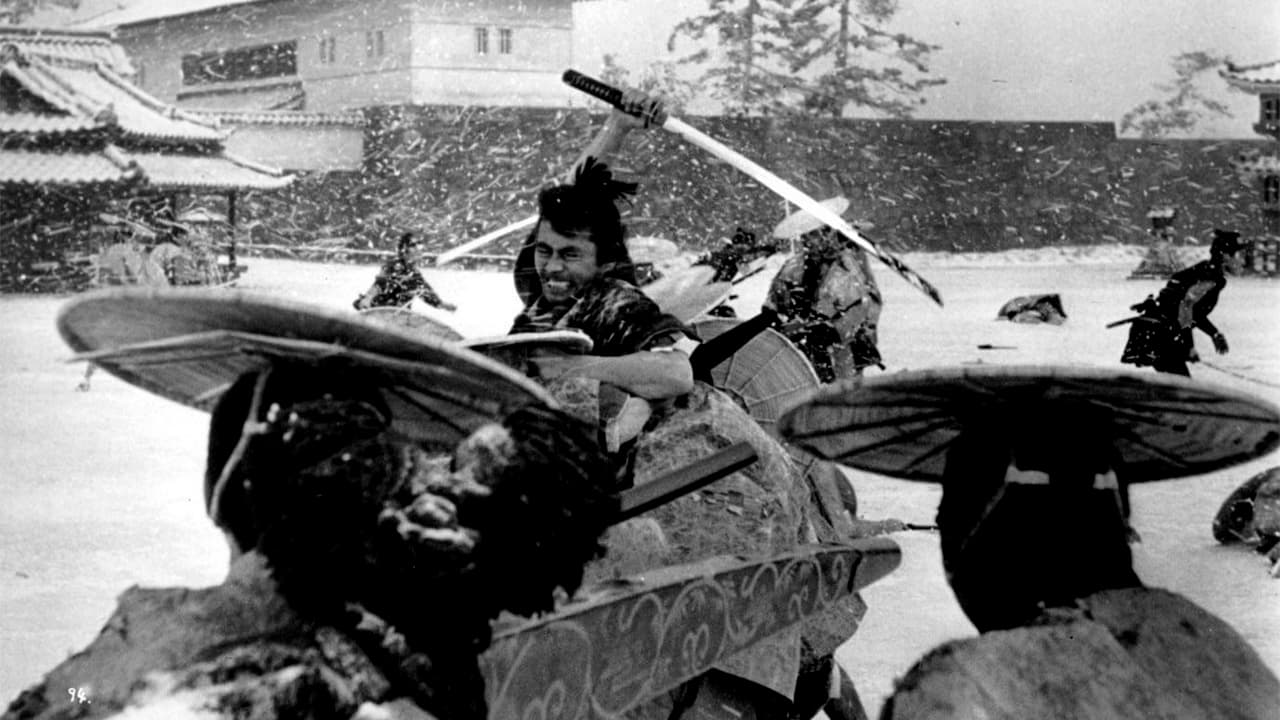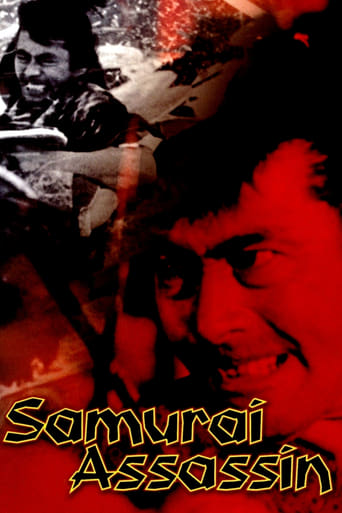Titreenp
SERIOUSLY. This is what the crap Hollywood still puts out?
Nonureva
Really Surprised!
Supelice
Dreadfully Boring
Reptileenbu
Did you people see the same film I saw?
chaos-rampant
Samurai Assassin is a tricky film. It tries to balance neatly between the chambara and jidai-geki. As a jidai-geki it falls close to Masaki Kobayashi's amazing masterpieces Seppuku and Samurai Rebellion in its resemblance of an ancient Greek tragedy filled with tragic irony and a sense of inescepable doom. On the chambara front it takes a while to deliver but when it does, it's all guns blazing; the final fight in the snow ranks as one of the greatest battle sequences in 60's samurai cinema.What hampers Samurai Assassin is both the very convoluted plot (even by jidai-geki standards) and the narration that should have been skipped altogether (especially in the ending). The plot although well constructed may suffer under close scrutiny. Of course nothing a little suspension of disbelief can't solve. Still, it devotes too much time and detail to subplots and flashbacks that ultimately detract from its goal: building momentum for the final confrontation (both physical and emotional). Tsuruchiyo's backstory for example is spread over 30 minutes and while it gives a solid foundation to the character, you can't help but wonder what it has to do with the first half hour. It all clicks together at some point but it would have benefited immensely from tighter plotting (20 could have been clipped). Less detail, narration and names-dropping, more visualization.No matter. Samurai Assassin is still a decent film with some memorable scenes. It starts to pick up steam after the 70 minute mark and finishes on a spectacular note. The final battle in the snow is a marvel to look at and features some top notch swordfighting, with Toshiro Mifune simply owning every frame with his impeccable physical skills. It's a very bleak and ironic ending however; there's no valliance or social status to be gained for Mifune's character. I don't want to spoil it any further cos it's easily the best part of the movie.Okamoto, a great chambara director of the 60's, was well on his way to bigger and better things. Just one year later, Sword of Doom would go on to become one of the best Japanese movies of all time. Three years later, the thoroughly enjoyable Kiru! would add some tongue-in-cheek spirit to Okamoto's often nihilistic style. Still, Samurai Assassin is a welcome addition to his ouevre that might not be excellent and thus not a good entry point to both Okamoto and the jidai-geki but it's recommended to genre fans.
massaster760
The year is 1860 and Japan is in a very unstable place. A time when the 300 year rule of the Shogunate was drawing to a close, an event which would simultaneously bring Imperialism to Japan and cause the death of the Samurai age. This is the setting of Samurai Assassin, a highly complicated, and character driven Chambara film that is shot in brilliant black and white. It also features one of Toshiro Mifune's best performances, as well as an astounding ending battle sequence that's just too cool for words.Mifune plays Niiro Tsuruchiyo, a master-less samurai who joins forces with the multiple clans against the Lord of Hikone, Sir Li Kamonnokami Naosuke. Li is the right hand of the shogunate and brought upon himself the wrath of the Satsuma, Mito, and Choshuu provinces after making an unpopular choice for the appointment of the 14th shogunate. Many critics arouse after the controversial appointment, and Li initiated the Ansei Purge to quiet critics of his choices. This in turn, lead to an assassination plot hatched by the three provinces in order to remove Li from his position of power. Here enters Mifune, who wants to help the clans, in order to become a samurai of the Mito house. If that's not enough, the clans have their own problems too trying to weed Li's spies out of the plot. Which results in a film full of intrigue, espionage, underhanded dealings, and of course assassinations. If all this sounds complicated...it's because it is.Looking past the intricate plot of Samurai Assassin and the film is basically a detailed character study of Mifune's Niiro. Much of the film deals with his mysterious past and is told through flashbacks, both as first hand accounts and through investigative processes headed by the clan who is trying to distinguish the followers from the spies. This serves as both a negative and a positive for Assassin. While it helps develop Mifune's character (and he's excellent as always), it also slows the film to a tedious pace. Also hidden in Niiro's past is a long story of forbidden love. The films first hour concerns itself mostly with these issues, while the second half slowly builds to an incredibly brutal finale. Bottom line- Samurai Assassin takes it's time to get where it's going, but when it arrives at its destination it redeems the films minor shortcomings. The finale is a brutal scene filmed in swirling clouds of snow and features an dizzying, blood soaked, action packed conclusion sure to satisfy any Chambara fan.
gkbazalo
Samurai Assassin is a complicated story but easier to follow than director Okomoto's excellent Sword of Doom made a year later. While it is clear that the band of assassins is seeking revenge on an official for an earlier purge on the assassins' clans, we never learn about the original reasons for their enmity. Historically, the disagreements concerned relations with foreign countries who were seeking to open up Japan to trade, but this is never alluded to in the film. The driving forces of the story, and they are good ones, are Niino's (Mifune) ambition to achieve full samurai rank and the paranoia of the leaders of the assassin band. These two forces interact nicely as the plot unfolds. Eijiro Tono (the innkeeper who befriends Mifune in Yojimbo) does his usual terrific job as the merchant who helped raise Niino and tries to protect him from meeting a tragic fate. Highly recommended for samurai and Mifune fans.
zetes
I am rather disappointed in Kihachi Okamoto's Samurai Assassin. I am a huge fan of his 1966 film, Sword of Doom, which is, as far as I'm concerned, the best "pure" samurai film, at least on the same level as anything by Kurosawa. Samurai Assassin was made the previous year. It is about a siege around Edo castle, and concentrates on one warrior, played by Toshiro Mifune, who desperately wants to become a samurai. He has been turned down in the past, though, because his mother was a geisha and his father was unknown.The script is the main culprit here. It's far too slow, and far too many names are dropped. For an American, anyway, it becomes increasingly difficult to process so many multi-syllabic Japanese names. Eventually, I didn't care at all about what was happening. Okamoto was obviously trying to go for the type of slow-build that was achieved, for example, in Misaki Kobayashi's excellent Sepukku (aka Hara-kiri, 1962), but the script is far too wordy.For most of the 2 hour 2 minute run, I was just concentrating on the beautiful cinematography. The black and white in this film is truly exquisite. A few good scenes managed to pop up here and there. Fortunately, Samurai Assassin ends on a fantastic note. The final samurai battle is one of the best I've ever seen. Okamoto uses snow as a prop as well as Kurosawa uses rain (there is a great snow battle in Sword of Doom, as well), and the level of dramatic irony equals some of the best Greek tragedies. My final judgement: Samurai Assassin is worth watching if you are a fan of samurai movies, but it is not a high priority. It is definitely a don't-see for anyone who has never seen one of these films before (start with Kurosawa, The Seven Samurai, Yojimbo, and Hidden Fortress for starters) or anyone who is unsure of whether they would be entertained by something like this. 7/10.

